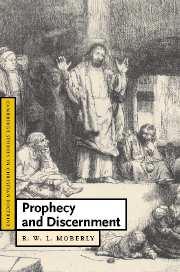Book contents
- Frontmatter
- Contents
- Preface
- List of abbreviations
- 1 What is prophecy, and can it be validated?
- 2 Jeremiah: the formulation of criteria for discernment
- 3 Micaiah ben Imlah: the costs of authenticity and discernment
- 4 Elisha and Balaam: the enabling and disabling of discernment
- 5 John: God's incarnate love as the key to discernment
- 6 Paul: cruciformity and the discernment of apostolic authenticity
- 7 Prophecy and discernment today?
- List of references
- Index of authors cited
- Index of scriptural references
- Index of subjects
5 - John: God's incarnate love as the key to discernment
Published online by Cambridge University Press: 05 May 2010
- Frontmatter
- Contents
- Preface
- List of abbreviations
- 1 What is prophecy, and can it be validated?
- 2 Jeremiah: the formulation of criteria for discernment
- 3 Micaiah ben Imlah: the costs of authenticity and discernment
- 4 Elisha and Balaam: the enabling and disabling of discernment
- 5 John: God's incarnate love as the key to discernment
- 6 Paul: cruciformity and the discernment of apostolic authenticity
- 7 Prophecy and discernment today?
- List of references
- Index of authors cited
- Index of scriptural references
- Index of subjects
Summary
The soul of a saint receives light from the Sun of Righteousness, in such a manner, that its nature is changed, and it becomes properly a luminous thing: not only does the sun shine in the saints, but they also become little suns, partaking of the nature of the fountain of their light … Christians are Christlike: none deserve the name of Christians that are not so, in their prevailing character.
– jonathanedwards (1959 [1746]:343, 346–7)Introduction
Although thus far I have sought to outline an understanding of critical discernment of prophecy within an Old Testament context, no Christian reflection upon the understanding and possible appropriation of this material would be complete without some account of how this issue is handled within the New Testament.
Broadly speaking, what one would expect to find in the New Testament is what one does find. That is, there are two main strands to the New Testament's engagement with critical discernment. On the one hand, the account within the Old Testament is presupposed, taken as read, and used accordingly. Indeed, so thoroughly is it presupposed within the bloodstream of faith that none of the New Testament writers, when engaging with this issue, ever cite any of the Old Testament material we have considered; yet, as will be seen, their pattern of understanding replicates the basic contours of the Old Testament understanding. Thus the New Testament writers continue the Old Testament tradition.
- Type
- Chapter
- Information
- Prophecy and Discernment , pp. 150 - 168Publisher: Cambridge University PressPrint publication year: 2006

